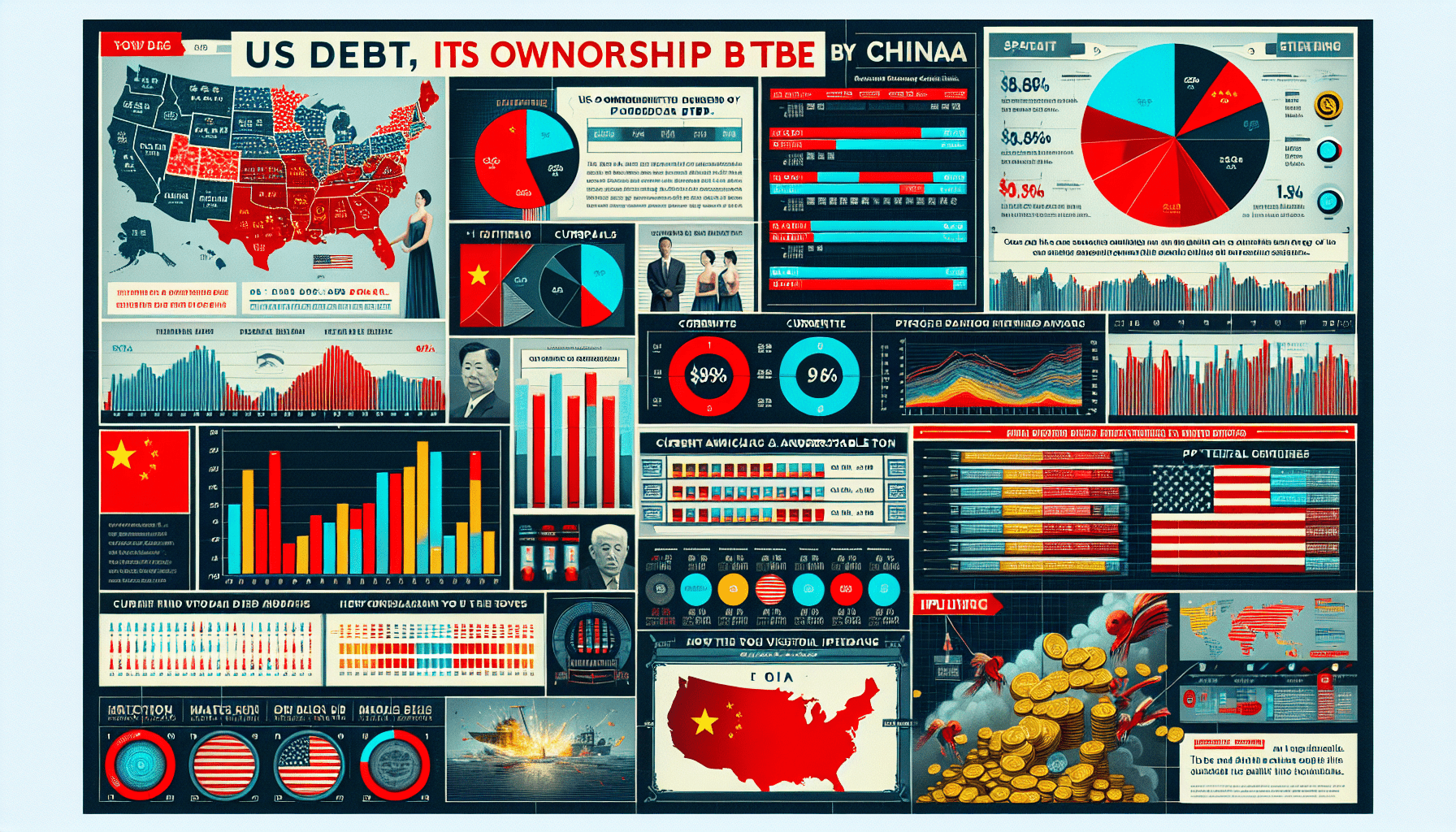Did you know that the relationship between the United States and China extends beyond just economic trade and cooperation? One particularly intriguing aspect is the amount of US debt that China owns. Have you ever wondered what percentage of the US debt is in the hands of the Chinese? In this article, we will explore the answer to this question and shed light on the implications it has for both countries. Stay tuned to unravel the mystery!

Understanding US National Debt
What is national debt?
National debt refers to the total amount of money that a country owes to creditors, including individuals, institutions, and other countries. It is the accumulation of the government’s borrowing over time to cover budget deficits and finance public expenditure. National debt is measured in terms of the outstanding amount of debt at a given point in time.
How does a country accrue debt?
A country accrues debt through various means, including borrowing from both domestic and international sources. Governments typically issue bonds, treasury bills, and other debt securities to raise funds. These securities are bought by investors, who lend money to the government in return for interest payments and the eventual repayment of the principal. Additionally, countries can also accumulate debt through bilateral or multilateral loans, such as those obtained from international organizations like the International Monetary Fund (IMF) or from other countries through diplomatic agreements.
Impact of national debt on economy and finance
National debt can have both positive and negative impacts on an economy. In some cases, a moderate level of debt can be beneficial, as it allows governments to invest in infrastructure, education, healthcare, and other areas that promote economic growth. By stimulating the economy, these investments can lead to increased productivity and higher living standards.
However, excessive national debt can pose significant risks. High levels of debt can crowd out private investment, increase interest rates, and reduce confidence in the government’s ability to manage its finances effectively. This can lead to lower economic growth, inflationary pressures, and financial instability. Additionally, a large portion of government revenues may need to be allocated towards interest payments on the debt, which leaves fewer resources available for public services and other critical government expenditures.
Overview of the US Debt
Total amount of US national debt
As of [insert latest data], the total amount of the US national debt stands at [insert total amount]. This staggering figure represents the cumulative result of decades of deficit spending by the US government.
The trend of US debt over the years
The trend of US debt has been on a continuous rise over the years. Historically, the United States has experienced periods of both surpluses and deficits in its budget. However, since the late 1970s, the country has consistently recorded budget deficits, resulting in a steady increase in national debt. Factors contributing to this trend include increased government spending, tax cuts, economic downturns, and financing wars and major social programs.
Major contributors to US debt
While the US debt is owed to various creditors, both domestic and foreign, some major contributors stand out. Social Security and other government trust funds hold a significant portion of the debt. Pension funds, mutual funds, and individual investors also play a substantial role in financing the debt. Moreover, foreign entities, such as foreign governments, central banks, and institutional investors, own a considerable share of the US debt.
Foreign Ownership of US Debt
Significance of foreign ownership of US debt
Foreign ownership of US debt holds significant implications for the US economy and its geopolitical relationships. The large proportion of debt held by foreign entities means that the US is reliant on foreign financing to fund its deficits. This dependency raises concerns about economic sovereignty and the potential for foreign entities to exert influence over US fiscal policy.
Identification of major foreign creditors
Among the foreign creditors, China has emerged as one of the largest holders of US debt. However, other countries such as Japan, the United Kingdom, and several oil-exporting nations also hold substantial amounts of US debt. It is important to analyze the role of each major foreign creditor to gain a comprehensive understanding of the impact of foreign ownership on US economic stability and global power dynamics.
Implications of foreign ownership on US economic sovereignty
The significant ownership of US debt by foreign entities poses challenges to US economic sovereignty. It raises questions about potential influence on US economic policy decisions, exchange rate stability, and the value of the US dollar. Moreover, foreign entities holding large amounts of US debt have the ability to quickly impact financial markets through their buying or selling decisions, potentially leading to volatility and disruptions in the US economy.
China as a Creditor to the US
Historical background of China’s involvement in US debt
China’s involvement in US debt can be traced back to the late 1970s when the two countries initiated diplomatic and economic relations. As China’s economy grew rapidly, it amassed substantial foreign exchange reserves, primarily denominated in US dollars. China started investing its reserves in US Treasury securities as a relatively safe and liquid investment option.
Reasons behind China’s acquisition of US debt
China’s acquisition of US debt serves several purposes. Firstly, it allows China to park its excess foreign exchange reserves in a stable investment that provides some returns. Additionally, holdings of US debt help to stabilize the US dollar, which is crucial for China as a major exporter to the United States. Furthermore, investing in US debt also strengthens China’s economic relationship with the US, allowing for greater economic cooperation and trade ties.
Comparison of China with other foreign creditors
While China is one of the largest foreign creditors to the US, it is important to compare its position with other major foreign creditors. Japan, for example, has long been a significant holder of US debt and continues to hold a substantial amount. Analyzing the similarities and differences between countries in terms of their motivations, investments, and potential risks provides valuable insights into the implications of foreign ownership on the US debt market.

Current Percentage of US Debt Owned by China
Latest statistics on China’s holding of US debt
As of [insert latest data], China holds around [insert percentage] of the total US national debt. This translates to a significant dollar amount, further highlighting China’s substantial role as a creditor to the US government.
Analysis of trends in China’s ownership of US debt
Over the years, China’s ownership of US debt has fluctuated. China has occasionally increased its holdings, but at other times, it has reduced its exposure. Analyzing these trends provides valuable insights into China’s diversification strategy, its assessment of risks associated with US debt, and potentially changing priorities in its investment portfolio.
Factors impacting the recent changes in China’s share of US debt
Several factors contribute to the recent changes in China’s share of US debt. Shifts in China’s economic growth, domestic financial policies, and its evolving geopolitical relationships, particularly with the United States, play key roles in influencing China’s decisions regarding its investments in US debt. Additionally, changes in the global economic landscape and global market conditions may also prompt adjustments in China’s holdings.
Implications of China’s Ownership of US Debt
Impact on the US economy
China’s ownership of US debt has implications for the stability and economic well-being of the US. A sudden decrease in China’s holdings could lead to higher borrowing costs for the US government, potentially increasing interest rates and hampering economic growth. Moreover, any decision by China to sell its US debt holdings could disrupt financial markets and weaken investor confidence, leading to broader economic repercussions.
Impact on US-China relations
China’s ownership of US debt also has implications for the relationship between the two countries. It can serve as a point of negotiation, shaping bilateral relations and potentially influencing US policy decisions on trade, currency, and other matters. Moreover, tensions arising from economic interdependence and diverging strategic interests can spill over into other areas of the US-China relationship, further complicating diplomatic ties.
China’s potential use of US debt as a political tool
China’s large holdings of US debt provide it with potential leverage in geopolitical disputes or negotiations with the US. While the consequences of using US debt as a political tool would be mutually detrimental, China could potentially weaponize its position as a creditor to exert pressure on the US or advance its own strategic objectives. This highlights the vulnerability of the US economy to foreign influence and the need for careful management of economic relationships.

Changes in China’s Strategy
Recent shifts in China’s investment strategy
In recent years, China has been gradually shifting its investment strategy away from US debt. While it continues to hold a significant amount of US debt, China has been diversifying its investments by allocating a greater share to other assets and countries. This shift reflects China’s efforts to manage risks, enhance returns, and reduce its dependence on US economic stability.
Implications of China’s reducing stake in US debt
China’s reducing stake in US debt has implications for both the US and global financial markets. As China diversifies its investments, it decreases its exposure to potential risks associated with US debt. However, this divestment could also impact the demand for US debt and potentially lead to higher borrowing costs for the US government if other buyers are not readily available.
China’s diversification into other countries’ debts
As part of its investment diversification strategy, China has been increasing its holdings of debt from other countries. It has been investing in bonds issued by other major economies like Japan, Germany, and the United Kingdom, as well as emerging markets. This strategy allows China to spread its risk and potentially leverage its investments to secure favorable trade agreements or strengthen diplomatic ties.
US Response to China’s Ownership of Debt
Policy changes aimed at reducing China’s influence
The US government has taken steps to reduce its dependence on China and mitigate the perceived risks associated with China’s ownership of US debt. This includes implementing policies to diversify funding sources, encouraging domestic lending, and exploring alternative financing methods. Additionally, there have been calls for greater scrutiny of foreign investments in critical sectors, particularly those with national security implications.
Efforts to encourage domestic lending and reduce foreign dependence
To reduce its reliance on foreign creditors, the US has implemented policies to stimulate domestic lending and increase national savings. This includes incentivizing banks to lend to domestic businesses and individuals, promoting investment in infrastructure projects, and implementing fiscal measures to reduce budget deficits. These efforts aim to strengthen the domestic economy and improve the US government’s ability to finance its deficit through domestic sources.
Consideration of the role of other foreign creditors
While China’s ownership of US debt has received significant attention, it is important to consider the role of other foreign creditors as well. Diversifying the analysis and understanding the implications of multiple countries holding US debt allows for a more comprehensive assessment of the risks, challenges, and opportunities associated with foreign ownership.

Future Projections for US Debt and China’s Share
Current economic forecasts for US debt
Economists and analysts project that US debt will continue to rise in the coming years. Factors such as growing entitlement programs, increased government spending, and the economic impact of the COVID-19 pandemic contribute to these projections. However, the pace of debt accumulation and its implications will depend on a range of economic and policy factors that could influence future fiscal policies.
Potential changes in China’s investment strategy
China’s investment strategy regarding US debt is likely to continue evolving in the future. As China aims to shift towards a more consumption-driven economy and increase its global influence, it may further diversify its investments away from US debt. This could include increased investments in its domestic economy, emerging markets, or other countries seeking investments.
Impact of global economic shifts on China’s share of US debt
Global economic shifts, such as changes in interest rates, shifts in global investor sentiment, and geopolitical tensions, can impact China’s share of US debt. Unexpected events or crises can trigger changes in investment strategies and reassessments of risk exposure. These factors can potentially lead to fluctuations in China’s ownership of US debt and impact the broader US debt market.
Concluding Remarks
Summary of key findings
Understanding US national debt and its implications is crucial for policymakers, economists, and the general public. Key findings include the significant and rising level of US debt, the major role of foreign ownership, particularly China, in the US debt market, and the potential implications for the US economy and its relationship with China.
Implications for US-Chinese relations
China’s ownership of US debt adds a layer of complexity to the already intricate US-Chinese relationship. It underscores the economic interdependence and the potential for both cooperation and conflicts of interest. Managing this relationship requires careful consideration of economic, political, and diplomatic factors to ensure mutual benefits and stability.
Potential areas for further research
While this article provides a comprehensive overview, several areas merit further research. These include analyzing the impact of US debt on China’s economic stability, investigating the potential use of US debt as a political tool, exploring the dynamics between different foreign creditors and their roles in the US debt market, and assessing the long-term implications of US-Chinese economic relations in the evolving global landscape.

